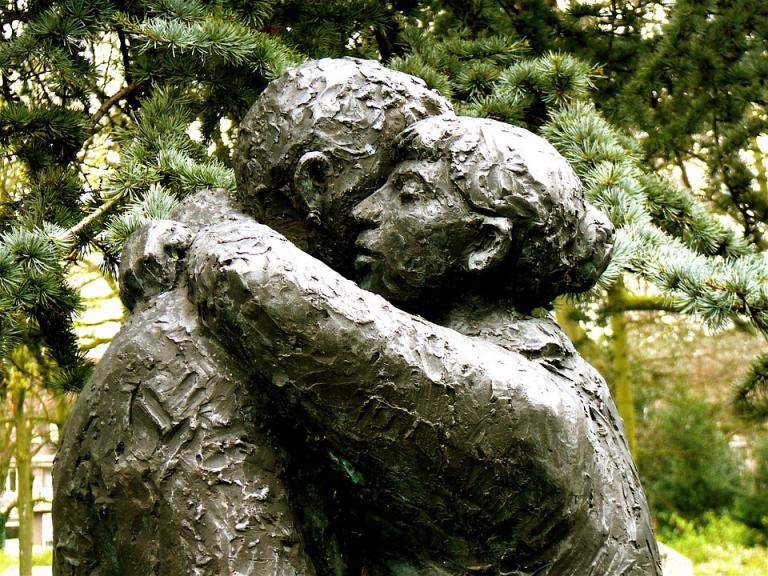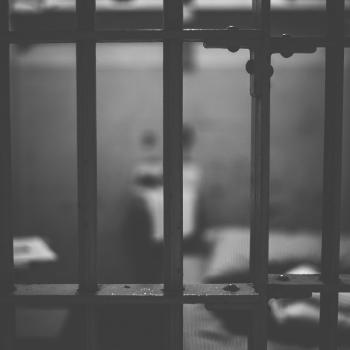
When I first started blogging last year, I have to admit I was not in a good headspace. It started out as a cathartic means of sorting through the years of cluttered baggage within me as well as a chance to be angry on the internet. And to an extent, it still has a tendency to be that type of outlet. Depending on the topics I write about, sometimes there is a hint (or a dash) of resentment that lingers in my writing. It’s easy to get angry and allow the past to grip and manipulate me and the decisions I make, but in this article I want to talk about one of the other things I struggle with the most…
Forgiveness has never been my strongest point. In fact, it is something I’ve struggled with for as long as I can remember. It has a lot more to do with personal experiences than upbringing. In the Catholic parish I grew up in, there were cases where a few members of our congregation had viewed my brother’s mental disability as the result of my family having unabsolved sin. I have also experienced excessive bullying throughout my junior high years, as I had mentioned in previous blog entries. It would be inconsiderate and arrogantly self-righteous of me to claim that I did nothing to my classmates to warrant such treatment on occasion, but more often than not I was usually cornered and outnumbered. There were several instances when the bullying felt so unbearable that I would often convince myself that my existence was a burden to everyone else – that people would be better off if I was dead.
In the midst of dealing with conflict at school, sometimes I not only fantasized about ways to end my own life, but the various ways I could wreak vengeance on my peers who made my life miserable. These thoughts were often violent in nature, yet I was raised in a manner that violence was not the solution to get a point across. Granted this, I would often internalize my loathing of my peers inwards towards myself, only to further deepen myself into depression.
It was only when I attended an Evangelical youth camp one summer that I realized how much I had been allowing my resentment from junior high to control my life. One of the guest speakers had talked about the importance of forgiveness and how deeply it affects our relationships with others as well as with God. I remember him quoting this specific passage in the Bible,
“For if ye forgive men their trespasses, your heavenly Father will also forgive you:
But if ye forgive not men their trespasses, neither will your Father forgive your trespasses.” – Matthew 6:14-15 (KJV)
As someone who had been raised Catholic, the fear of eternal damnation for holding a grudge on a group of individuals who were no longer a part of my life was something I never wanted weighing on my conscience. I approached the guest speaker that same evening after the chapel session was done. After commending him for his little sermon, he asked me whether I had been saved. I was completely dumbfounded by such a question. I had no idea what that even meant, let alone what the whole point of Jesus’ death and resurrection was about. It was at that moment we both prayed together, and an overwhelming sense of relief and excitement took over. The initial discovery of why He suffered, died and rose again for the forgiveness of the world’s sins was a feeling that sparked a lot of zeal within me.
But even after what should have been considered a life-altering event, my struggle with forgiveness did not end there. Accepting Christ in my heart led me to engage in many discussions with Christian friends regarding faith and theology. Because I had no Catholic friends who were well-versed in their beliefs, I was quick to adopt many ideologies that aligned with my friends worldviews – some I soon discovered to be highly anti-Catholic in nature.
As kind and loving as Christians claim to be, it didn’t take long for me to realize they are not immune to treating each other horribly. It especially became more evident to me after a few of these friends treated me equally as harsh as my peers had done in junior high.
To put a long story short, I’ve often felt as though I was duped into becoming a Christian out of fear just to become another butt in the pews. I was convinced that Bible-ministry was just another sales pitch to mould people’s minds into a state void of any capacity for critical thinking. The more I thought about it, the deeper my disdain towards Christianity as a whole had become, and the more I began to toy with atheism. It was easy to slip into the same pit of resentment I was so familiar with prior to my drastic conversion at summer camp. Because many Christians believe in the ‘once saved, always saved‘ ideology, I also began to question whether that pivotal moment at camp was just my raging, teenage hormones giving me all the feels – or whether or not I was ever actually serious about following Christ.
Because of the traumatic experiences I’ve had in dealing with hostile people, I find it difficult to not feel like I have an ax to grind. It’s easy to convince myself that the world is out to get me, and the desire for vengeance can be quite overwhelming. I’ve often heard some people say, when you forgive others you are not doing it for others, but for yourself. While I agree with this to an extent, I don’t believe forgiveness should be first and foremost a self-centered action even though it can be.
Sometimes forgiving others is also about allowing the opportunity to work peace in other peoples hearts along with our own, even if they aren’t willing to accept that forgiveness.
It’s about breaking the cycle.
As far as forgiving those who willfully want to do harm on us, forgiveness is not a synonym for tolerance. It doesn’t convert the harm that was done to us into a righteous act, nor does it remove the damage it has done or pretend it never happened. Forgiveness means addressing the harmful act, confronting it head-on, and then engaging the offender in a manner that attempts to impede any more hostility.
In the case of my former acquaintances, I cannot pursue a relationship with said people because they pursued to inflict harm on me. I cannot compromise the safety of myself and my own family for the sake of attempting dialogue with people who willfully desire to make my life miserable. As important as it is to forgive others, sometimes the opportunity to confront my offenders isn’t worth risking my health, well-being or the safety of the ones I love – lest I become even more resentful in the process.
Similarly, as much as I desire to receive forgiveness from the people I know I have wounded, I cannot expect them to be willing to engage in return. Sometimes we have to learn how to let go of the wrong that was done and move on without having to confront them.
The most humbling experiences I’ve had were cases when I knew I had done wrong on others, and knowing the gravity of the damage I had caused. I’ve lost a lot of sleep in preparing myself for receiving well-deserved punishment for my sins. Yet, the most humbling and relieving experience is having the ones I’ve hurt confront me and say,
“You have wounded me. I am still hurt by what you’ve done, and it will take some time and work to heal….. but I forgive you and I release you.”
Personally, I have a tendency to be hard on myself to the point of self-deprecation. As much as I struggle with forgiving others, I equally struggle with forgiving myself. Even with the knowledge of what the actual truth is, my mind often tries to convince me otherwise that I do nothing but burden or harm other people.
It comes without saying that if I’m truly sorry for what I have done, I ought to do everything in my power to avoid making the same mistakes again. As an Evangelical in my early twenties, I once viewed the Catholic doctrine of penance as a form of works-salvation. It was only later in life that I discovered the meaning of penance has nothing to do with the forgiveness of sins, but rather has more to do with repairing the damage caused by sin. This is a topic meant for a completely separate article, but in many ways, earning someone’s trust after being forgiven of a great offence could be viewed as an example of a penitent act. This isn’t to say that Catholics perform sacrifices, almsgiving and acts of kindness as a way to invalidate what Christ had already done for us on the cross once for all. But it has more to do with partaking in His suffering by working against our natural tendencies to sin – all with the help of the grace of the Holy Spirit working within our hearts.
I could spend my whole life hating and blaming religion for the painful events in my life. But in retrospect, I have every reason to thank my Christian friends for introducing me to a relationship with God. If it weren’t for the ministry of Evangelicals, I never would have given Catholicism a second thought, nor would I have acquired the zeal to dig deeper into such a vast and intimidating theology. There is so much value to their ministry, and I can guarantee if it weren’t for finding new friends at a Protestant Bible camp, I would not be here today writing this very article. I can honestly say from experience that the Catholic Church can learn from our Evangelical brethren on effective ways to reach out to our communities, teach the lessons of the Bible that are easy to understand and how to instill a passion in individuals for serving Christ.
I’ve been thinking about the parable of the man who was forgiven a great debt, and how it directly relates to how I’ve treated others in light of my own wrongdoing. When all is said and done, if I can’t forgive those who have hurt me or done me wrong, how can I expect others to forgive me for worse things? How can I expect God to forgive me for the damage I’ve caused to others if I can’t even work past my own resentment towards those who have hurt me in the past?
Knowing this, what gives me comfort is reading about the parable of the prodigal son. If I was in that guy’s shoes, I don’t think approaching the father with an attitude that the world owes me something would end very well. In my reflection on this passage, it is better to approach someone with humility than with an arrogant, entitled demeanor – whether the offender is myself or the other person. And the truth is, the world doesn’t owe me a dime of compensation. Even though I had received a lot of unjust treatment from people in my life, I’m probably just as guilty myself for inflicting equally unjust treatment on others.
My life is a mess. Other people’s lives are a mess. The whole world is a mess. It’s like a giant pile of dirty rags where everyone thinks they are cleaning up the mess by doing what’s right in our own eyes, yet we’re spreading dirt everywhere.
But I guess a good place for me to start is to admit I’ve been one of those dirty rags.












